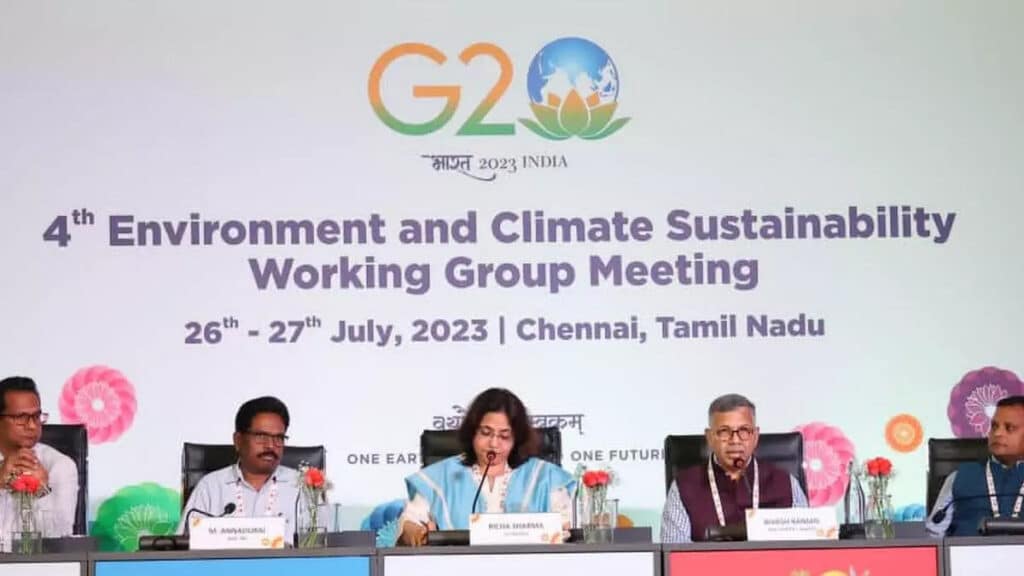India has set an ambitious target to restore 26 million hectares of forest land, according to Bivash Ranjan, the Director-General of forests for the Union Ministry of Environment, Forests and Climate Change.
In addition, the country plans to create 2.5-3 billion tonnes of additional carbon sinks.
According to Mr Ranjan, 27 per cent of India’s forest area is impacted by forest fires, significantly curbing natural regeneration.
India has reclaimed 38 per cent of forest area lost to mining, “and the target is to reclaim the remaining 62 per cent,” he said.
Crucially, “3.5 per cent of the country’s tree cover loss is due to deforestation.”
India Hosts G20 Environment and Climate Sustainability Working Group
It is hosting 300 delegates from G20 countries, where today it will launch a ‘coalition for global circularity’ known as the ‘Resource Efficiency Circular Economy Industry Coalition.’
As the current G20 President, Environmental Ministers from the world’s 20 largest economies are in Chennai as part of the ‘4th Environment and Climate Sustainability Working Group (ECSWG) and Environment and Climate Ministers meeting.
Bhupender Yadav, the Union Minister for Environment, Forest and Climate Change (MOEPCC), will launch the new global coalition.
Naresh Pal Gangwar, Additional Secretary, MoEFCC, said, “The initiative is to become a momentous achievement during the G20 India Presidency.”
It represents a significant push to “foster on-the-ground efforts in resource efficiency and advancing the principles of the circular economy.”
The first-of-its-kind initiative will create a global coalition to encourage resource efficiency and circular economy by uniting nations, industries, and experts.
One of the thematic areas of the G20 meeting under the Environment and Climate Sustainability Working Group is land restorations, accelerating ecosystem-based approaches and biodiversity conservation.
Crucially, sustainable forest management plays a crucial role in achieving climate goals.
“These degraded areas are originally biodiversity-rich landscapes,” Mr Bivash told reporters before the meeting.
“We have to restore and take care of them,” he said.
“The G20 Global Land Initiative (GLI) was launched during the Saudi presidency, and the ambition was to prevent, halt and reverse land degradation and reduce degraded land by 50 per cent by 2040.”
India has 27 per cent of its area under conservation and 22 per cent under area-based protection.

India has emerged as a global power in forestry
In a 5-year outlook published by New Forests, timber demand in India will drive global consumption over the next 10-15 years.
“For investors, the long game is gaining exposure to high-quality forestry plantations serving the rising demand for a circular bio-economy and urbanisation of the Indo-Pacific region.”
According to the World Bank, the Indo-Pacific region will drive a fourfold increase in demand for timber products over the next 30 years.
Last month, Wood Central reported that 91% of Australian softwood exports were destined for Indian ports – fuelling a surge in demand for construction.
In recent months, Australia and New Zealand have looked to India as a substitute market for China – with tariffs on Australian forest products to be eliminated over the next six years.
“In the first six months of Australia’s Free Trade Agreement with India, Australian businesses have benefitted from lower tariffs on more than $12 billion in exports,” according to Australian Minister for Agriculture and Forestry Murray Watt.
The opportunities for the Australian and New Zealand forest and wood product industries are endless.
Although India’s forest cover has increased steadily for nearly two decades, timber production is substantially less than consumption, and imports are meeting an increasingly large proportion of demand.
The International Tropical Timber Organization (ITTO) reports that a shortfall between wood production and demand will exacerbate a substantial increase in wood consumption in India by 2030.






